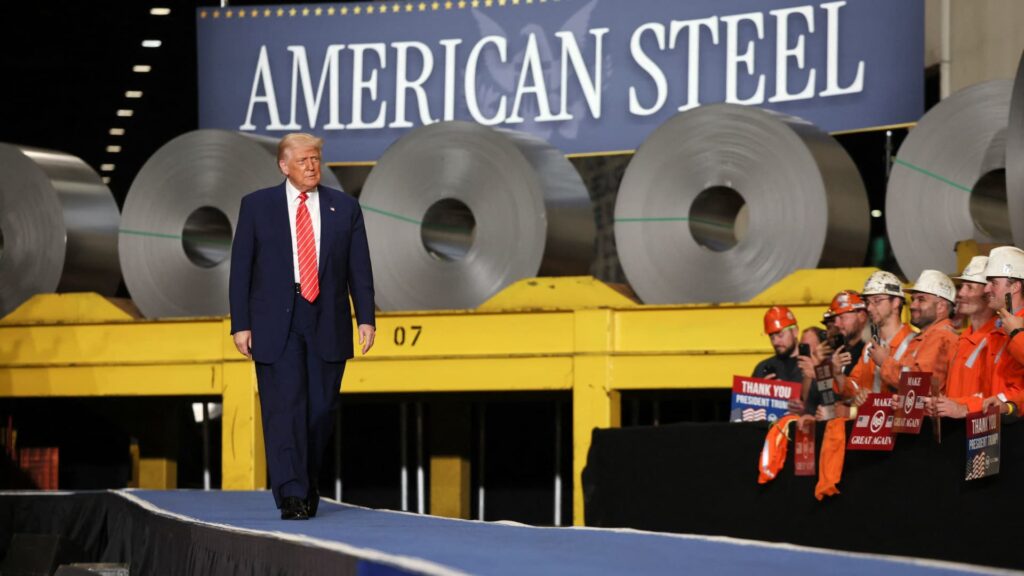
WEST MIFFLIN, PA – President Donald Trump has secured unprecedented veto power over U.S. Steel’s strategic decisions through a “golden share,” a move formalized by an amended corporate charter filed with the Securities and Exchange Commission. This development grants Trump significant influence over the company’s operations, marking a unique intersection of business and government.
Breaking: Presidential Influence on U.S. Steel
President Trump now wields sweeping control over U.S. Steel’s key decisions, a power not typically held by a sitting president. The “golden share” allows him to veto major corporate actions, a role he has chosen to personally assume, according to White House sources.
“President Trump can also designate someone else for this role but is choosing to hold it himself,” a White House official told CNBC.
Immediate Impact
The immediate effect of Trump’s involvement was seen in the approval of a contentious merger between U.S. Steel and Japan’s Nippon Steel. Despite initial opposition, Trump endorsed the merger following a national security agreement, illustrating his direct influence through the “golden share” arrangement.
Key Details Emerge
According to the amended corporate charter, the veto power will transition to the Treasury and Commerce Departments after Trump’s presidency. This ensures continued governmental oversight, albeit through different channels.
The “golden share” grants veto power over:
- Changing U.S. Steel’s name or headquarters.
- Closing or selling production locations through 2035.
- Cutting employee base salaries through 2030.
- Delaying $10.8 billion in capital investments.
- Acquiring competing businesses in the U.S.
Industry Response
United Steelworkers International President David McCall expressed concern over the unprecedented level of control, noting that Trump “has assumed a startling degree of personal power over a corporation.” The union’s apprehension reflects broader industry unease about political influence in corporate governance.
By the Numbers
Key Figures:
– $10.8 billion: Capital investment timeline subject to delay.
– 2035: Year through which production location decisions are controlled.
– June 30, 2025: Scheduled delisting of U.S. Steel from the NYSE.
What Comes Next
Looking ahead, the transition of veto power to the Treasury and Commerce Departments raises questions about future presidential influence. Experts suggest this could set a precedent for governmental involvement in private sector decisions, particularly in industries deemed critical to national security.
Background Context
The “golden share” concept is not new, but its application in this context is notable. Typically, such shares are used to maintain control over strategic industries. In this case, it underscores the U.S. government’s commitment to safeguarding domestic steel production amid global competition.
Expert Analysis
Stephen Heifetz, a former member of the Committee on Foreign Investment in the United States, remarked on the unusual nature of this arrangement. “It’s unprecedented for a sitting president to wield such direct control,” he said, adding that the arrangement might be more symbolic than substantive, given the executive branch’s inherent influence over the Treasury and Commerce Departments.
Regional Implications
For Pittsburgh, home to U.S. Steel, the implications are profound. The city’s economic landscape, heavily reliant on steel production, could see shifts depending on how this power is exercised. Local stakeholders are keenly watching how these developments unfold.
Timeline of Events
Key Dates:
– May 30, 2025: Trump visits U.S. Steel Corporation–Irvin Works.
– June 12, 2025: Trump announces control over the “golden share.”
– June 13, 2025: Approval of U.S. Steel and Nippon Steel merger.
– June 18, 2025: U.S. Steel shares stop trading on NYSE.
– June 30, 2025: Scheduled delisting from the exchange.
As the situation develops, stakeholders and industry experts will continue to monitor the impact of Trump’s “golden share” on U.S. Steel’s operations and the broader implications for corporate governance.







